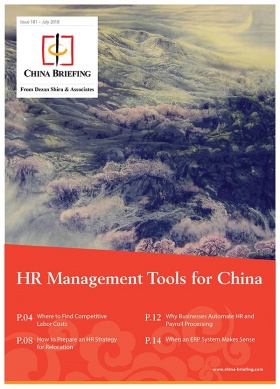Sexual Harassment in China: #MeToo Movement Prompts New Legal Developments
With the #MeToo movement gaining momentum, new measures to combat sexual harassment in China were recently introduced by the government.
The responses come after a series of high-profile sexual harassment scandals gripped the country this year – from the Didi assaults to allegations against both journalist Zhang Wen and Beihang University Professor Chen Xiaowu.
Receiving greater exposure under the #MeToo movement, these instances showed the pervasive nature of sexual harassment in China.
It has effectively placed the issue of sexual harassment front and center – making it impossible for the top levels of government to ignore.
New measures combating sexual harassment
At the national level, China is preparing the Draft Civil Code, which is set for a complete and final review by 2020. It requires employers in the country to take reasonable measures against sexual harassment in the workplace.
Similarly, at the local level, Jiangsu province enacted new legislation that imposes an affirmative duty on companies to take certain steps to tackle the issue of sexual harassment in the workplace.
Together, these recent legislative measures signify a shift from instilling a general right to be free from sexual harassment to establishing a duty to create a harassment-free workplace.
Businesses should stay on top of both national and local level laws to ensure their anti-sexual harassment policies reflect the new compliance thresholds.
HR managers should pay close attention as the changing legal climate will hold employers to greater account – demanding safer working standards that remove the scope for sexual harassment and provide proper redress in cases of violation.
China’s national sexual harassment laws: broad-based, poor enforcement
At the national level, China enacted its first law prohibiting sexual harassment in 2005; several Western countries had enacted such legislation in as early as the 1980’s. Although a latecomer to the issue, China has now passed several laws that specifically prohibit sexual harassment, including in the workplace.
Recently, the second phase of the Draft Civil Code was submitted to the national legislature for review. Of the six new sections submitted to the legislature, one section makes clear reference to the issue of sexual harassment.
Victims can now demand that perpetrators assume civil liability for acts of sexual harassment. Additionally, employers must take reasonable measures to prevent sexual harassment and provide proper channels of complaint.
The state-owned news agency Xinhua stated that these measures will hold employers responsible. However, the government is yet to release details as to how this will be enforced.
Although this law is arguably no more comprehensive than what currently exists at the national level, the inclusion of ‘sexual harassment’ in the Draft Civil Code indicates the government’s commitment to making it a priority concern.
Besides the Draft Civil Code, the national framework on sexual harassment comprises the following:
- PRC Law on the Protection of Women’s Rights: article 40 explicitly prohibits sexual harassment against women while giving female victims a right to file complaints with the respective unit in which they work.
- Special Provision on Labor Protection for Female Employees (State Council Order No.619): article 11 stipulates that employers shall prevent and curb sexual harassment towards female employees at work premises.
- Criminal Law of the PRC: article 237 criminalizes the indecent assault of a woman and subjects offenders to a maximum fixed-term imprisonment of 5 years. Indecent assault is defined as “coercively molesting others or humiliating women by violence, that or other means.”
- China Women’s Development Program (2011-2020): obligation of employers to prevent sexual harassment in the workplace has been emphasized to “effectively prevent and stop sexual harassment against women.”
- National Human Rights Action Plan (2016-2020): makes reference to women’s rights and also to the goal of preventing and reducing sexual harassment against women.
All the same, where the prevailing anti-sexual harassment legislation fails in China is in its quality of enforcement. Legislation and regulation pertaining to sexual harassment tend to be broad-based, preventive, and underpinned by weak prosecution. While the laws explicitly prohibit sexual harassment, they provide little detail on ‘what’ amounts to sexual harassment nor do they provide for means of accountability.
Local laws stronger, enforcement still varies
In China, it is common for local regulations to fill in the gaps left by national laws. This leaves it to the discretion of provincial or municipal governments to define what was intended by the national law.
Currently, Beijing, Shanghai, Jiangsu, and Guangdong define sexual harassment as: “actions against a woman by means of language, words, images, electronic information or bodily actions related to sex or containing sexual content against her will.”
Shenzhen takes the definition a step further to include “…. utilizing one’s position, employment or other advantage as a condition to exchange interests in relation to hiring, promotion, salary, award, etc.”
However, there are two main concerns regarding these definitions. ‘Sexual harassment’ is still too broadly defined, and the laws do not provide for adequate accountability measures for a victim to seek redress or for companies to stay accountable.
More recently, Jiangsu province introduced new sexual harassment rules that could mark a turning point in China’s sexual harassment policies. On July 1, 2018, the province enacted new regulations that established an affirmative duty on companies to tackle sexual harassment in the workplace – one of the first in China.
The Special Provision on Labor Protection of Female Workers in Jiangsu Province (“Special Provisions”) is the first of its kind and significant on three fronts. Firstly, it provides a clear definition of sexual harassment; secondly, it requires companies to implement internal rules prohibiting sexual harassment; and lastly, it necessitates a sexual harassment complaint channel to be established within a company.
Further, the Special Provisions does not limit protection to female employees – and therefore has the potential to apply to third parties, such as female customers and visitors alike.
Although strictly speaking this is not the first time that China has enacted affirmative action sexual harassment law, this is the first time the requirements have been so clearly defined.
Specifically, the Special Provisions now require employers to:
- establish rules and regulations against workplace sexual harassment;
- offer workplace education and training to prevent sexual harassment;
- promote a general working environment free from sexual harassment;
- create an effective complaint channel that is handled effectively and appropriately; and
- take all other measures needed to prohibit and prevent sexual harassment of female employees.
8 years, 34 cases, zero success rate – where to from here?
According to a study conducted by Beijing Yuanzhong Gender Development Center, nearly 40 percent of women were reported to have experienced sexual harassment in the workplace in China. Sadly, these victims were not adequately represented in the court system.
Despite the prevalence of sexual harassment, the study goes on to find that amid the 50 million court verdicts made publicly available in China between 2010-2017, only 34 focused on sexual harassment. Of these cases, only two were actions brought to the court by the victim, both were eventually dismissed for lack of evidence.
This signals a clear flaw – either in the legal system or in the speak-up culture itself.
Although the recent developments to strengthen anti-harassment rules are a positive step towards combating sexual harassment, China still has a long way to go in defining and stipulating enforcement mechanisms curbing sexual harassment for the laws to be effective.
For example, the Civil Rights Act of the United States not only defines sexual harassment clearly, but also stipulates that if the employer does not actively take measures to prevent sexual harassment or inaction after the incident, it will bear joint and several liability, and the employer is likely to be sentenced to pay sizeable compensation.
As more Chinese provinces follow suit with their own revised sexual harassment laws – perhaps using Jiangsu’s new rules as a basis – businesses should review their HR policies and practices to ensure they are taking enough steps to prevent harassment in the workplace and comply with national and local level laws.
About Us
China Briefing is produced by Dezan Shira & Associates. The firm assists foreign investors throughout Asia and maintains offices in China, Hong Kong, Indonesia, Singapore, Russia, and Vietnam. Please contact info@dezshira.com or visit our website at www.dezshira.com.
- Previous Article China’s New e-Commerce Law: Businesses Should Ready for Stronger Compliance Norms
- Next Article China’s New Gaming Regulations: What it Means for Investors









